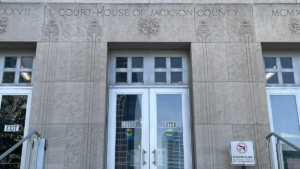17:17
News Story
Missouri Supreme Court denies Lamar Johnson a new trial
The ruling is a blow for prosecutors hoping to establish special units to review cases of wrongful conviction and prosecutorial misconduct

On Nov. 3, 1994, Lamar Johnson (in white pants) was placed in a line up, where he was eventually identified as the murderer. Circuit Attorney Kim Gardner alleges that the eye witness who identified Johnson received payment from a former assistant circuit attorney (Photo included in Circuit Attorney’s Conviction Integrity Unit’s report).
Nearly two years ago, St. Louis Circuit Attorney Kim Gardner filed a motion for a new trial for Lamar Johnson, who has now spent 26 years in jail.
Gardner alleged former prosecutors and police fabricated evidence to get Johnson’s murder conviction in 1995. However, a circuit judge ruled Gardner didn’t have the power to file for a new trial, decades after Johnson was convicted, and dismissed the motion.
The case took many twists and turns, including Attorney General Eric Schmitt joining the argument that Gardner doesn’t have the authority.
On Tuesday, the Missouri Supreme Court sided with Schmitt, ruling that there is currently no state law that gives prosecutors authority to seek a new trial so many years after the case was adjudicated.
The legislature must first adopt a law “authorizing a circuit or prosecuting attorney to file a motion for new trial upon discovery of evidence indicating a wrongful conviction,” Chief Justice George W. Draper III wrote in a concurring opinion.
In wrongful conviction cases, there needs to be a mechanism for the state to “redress an error it helped create,” Draper wrote.
Schmitt’s spokesman said, “The Circuit Court brought our office in not to comment on innocence or guilt, but to ensure that the rule of law is upheld and the proper procedure is followed, and that’s exactly what we did.”
When Johnson learned about the Supreme Court decision, he said, “It is sad that rules and technicalities matter more than someone’s innocence,” according to his attorney Lindsay Runnels.
Gardner called the ruling “deeply disappointing.”
“Our Conviction Integrity Unit determined there is clear evidence to suggest that Lamar Johnson has wrongly sat in prison for over 20 years, convicted of a crime he did not commit,” Gardner said in a statement. “This case is about the duty of a prosecutor to be a true minister of justice.”
The ruling is also a blow for a growing movement of elected prosecutors nationally who are establishing special units to review potential cases of wrongful conviction and prosecutorial misconduct.
“By declining to give prosecutors a mechanism to fulfill their sacred duty to correct an injustice, the Supreme Court’s decision puts the burden of correcting a wrongful conviction squarely on the shoulders of the wrongfully convicted themselves,” Runnels said
It could also be damaging for the court system’s standing with the community, said Michael Wolff, former Missouri Supreme Court chief justice.
“If you elevate the procedural mechanisms over what is, in fact, justice, then you’re not going to get the kind of public confidence or support that the judiciary needs in order to function with the confidence of the people of this republic,” Wolff said. “Very simple.”
In the ruling, the court made clear that the case was not about Johnson’s innocence, but rather whether he had the “authority” to appeal the city court’s dismissal of Gardner’s motion for a new trial.
“No such authority exists,” the ruling states, “therefore, this Court dismisses the appeal.”
Judge Laura Denvir Stith noted in her concurrence that the misconduct outlined in Johnson’s filings, “if proved, would result in Mr. Johnson’s exoneration.”
Johnson will be filing a petition for writ of habeas corpus to get an evidentiary hearing to review some of the new evidence, Runnels said.
How long that process takes is up to the attorney general, she said.
Stith wrote that attorneys general have joined in habeas actions in the past and have also “conceded error.”
“This Court anticipates and expects the attorney general will apply these principles when called upon to consider whether to oppose a petition for writ of habeas corpus or other pleading filed by Mr. Johnson or others,” Stith wrote.
However, Schmitt could also “delay and obstruct” the process, which would mean it could take years for Johnson to even get a hearing, Runnels said.
In 2019, Gardner filed a 67-page motion that she claims provides evidence that the homicide detective in the case made up witness testimonies for the police report that was entered into evidence. Witnesses were not aware of the changes until later.
Documents included in the motion allege that an assistant circuit attorney paid off the only eyewitness and cleared some of his outstanding tickets.
Tuesday’s ruling will have an impact on St. Louis County and Jackson County, where prosecutors have also set up units to review these cases.
“A prosecutor who has evidence of a defendant’s innocence cannot and should not stand idly by while that defendant remains in prison,” said St. Louis County Prosecutor Wesley Bell. “Under Missouri law right now, there is nothing that prosecutor can do to bring that evidence before a court. That is wrong, and we should right it.”
Bell is calling on lawmakers in Jefferson City to pass a bill giving prosecutors’ offices the right to have a hearing in cases of wrongful conviction.
Through 2018, conviction integrity units across the country had been responsible for producing 344 exonerations nationwide, according to an amicus brief in support of Gardner submitted to the Missouri Supreme Court signed by 45 elected prosecutors in 25 states.
Gardner said her office will continue to seek justice in this case and others like it. “What is at stake is equal justice under the law,” she said, “and public trust in the integrity of the entire criminal justice system.”
Our stories may be republished online or in print under Creative Commons license CC BY-NC-ND 4.0. We ask that you edit only for style or to shorten, provide proper attribution and link to our website. AP and Getty images may not be republished. Please see our republishing guidelines for use of any other photos and graphics.




